Nursing Leadership and Strategies for Interprofessional Relationships
VerifiedAdded on 2023/01/23
|8
|2289
|74
Essay
AI Summary
This essay delves into the critical role of nursing leadership in fostering interprofessional collaboration within acute healthcare settings. It highlights the importance of effective communication, team-building, and lifelong learning as key strategies for enhancing leadership skills. The essay draws on various research papers to emphasize how nurse leaders facilitate interprofessional relationships, improve patient care, and drive positive changes within healthcare environments. It also discusses the significance of shared goals, mutual trust, clear roles, effective communication, and measurable outcomes in successful interprofessional collaborations. The essay concludes by summarizing the personal attributes, such as strong communication and involvement, that contribute to enhanced nursing leadership and ultimately improve patient outcomes.
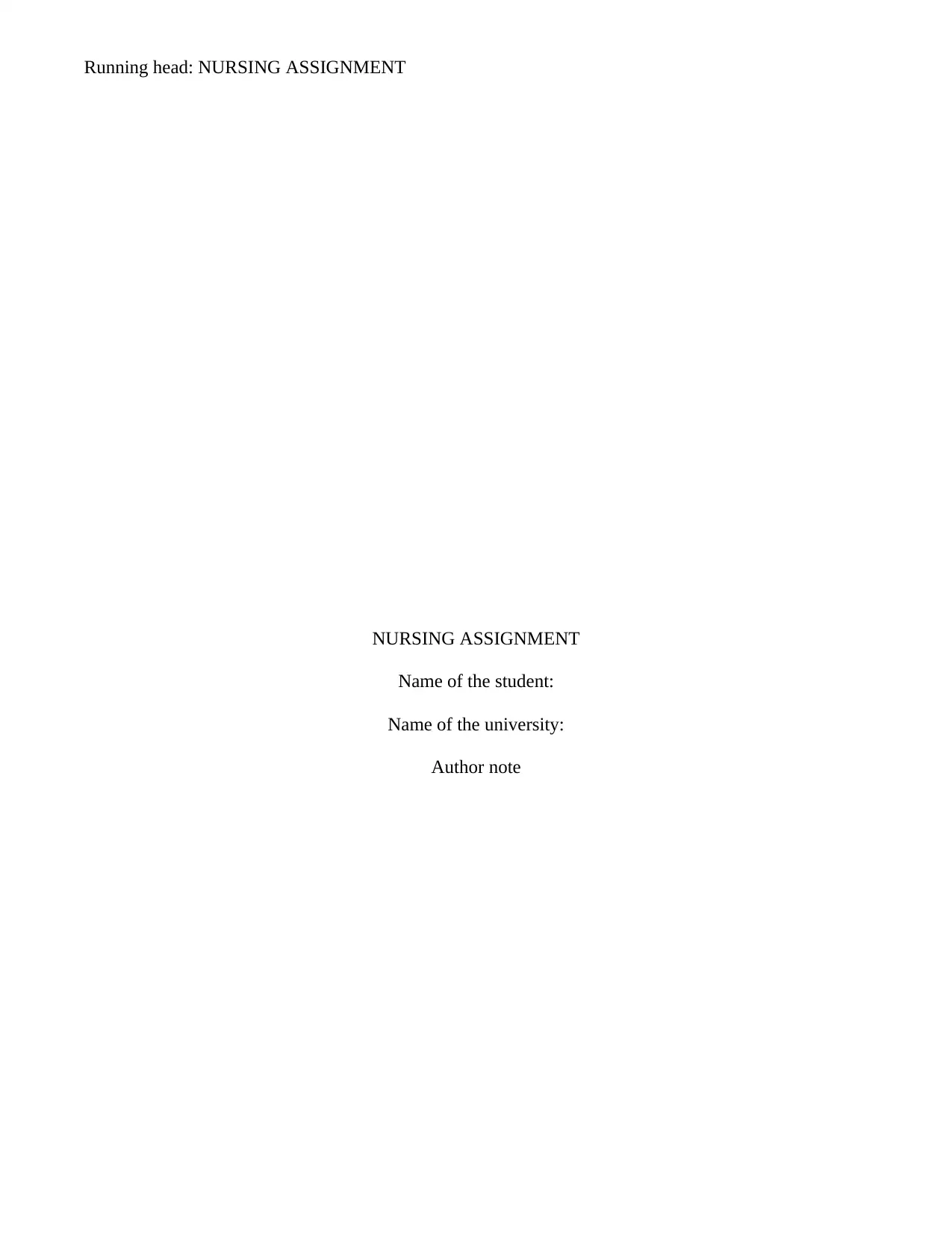
Running head: NURSING ASSIGNMENT
NURSING ASSIGNMENT
Name of the student:
Name of the university:
Author note
NURSING ASSIGNMENT
Name of the student:
Name of the university:
Author note
Paraphrase This Document
Need a fresh take? Get an instant paraphrase of this document with our AI Paraphraser
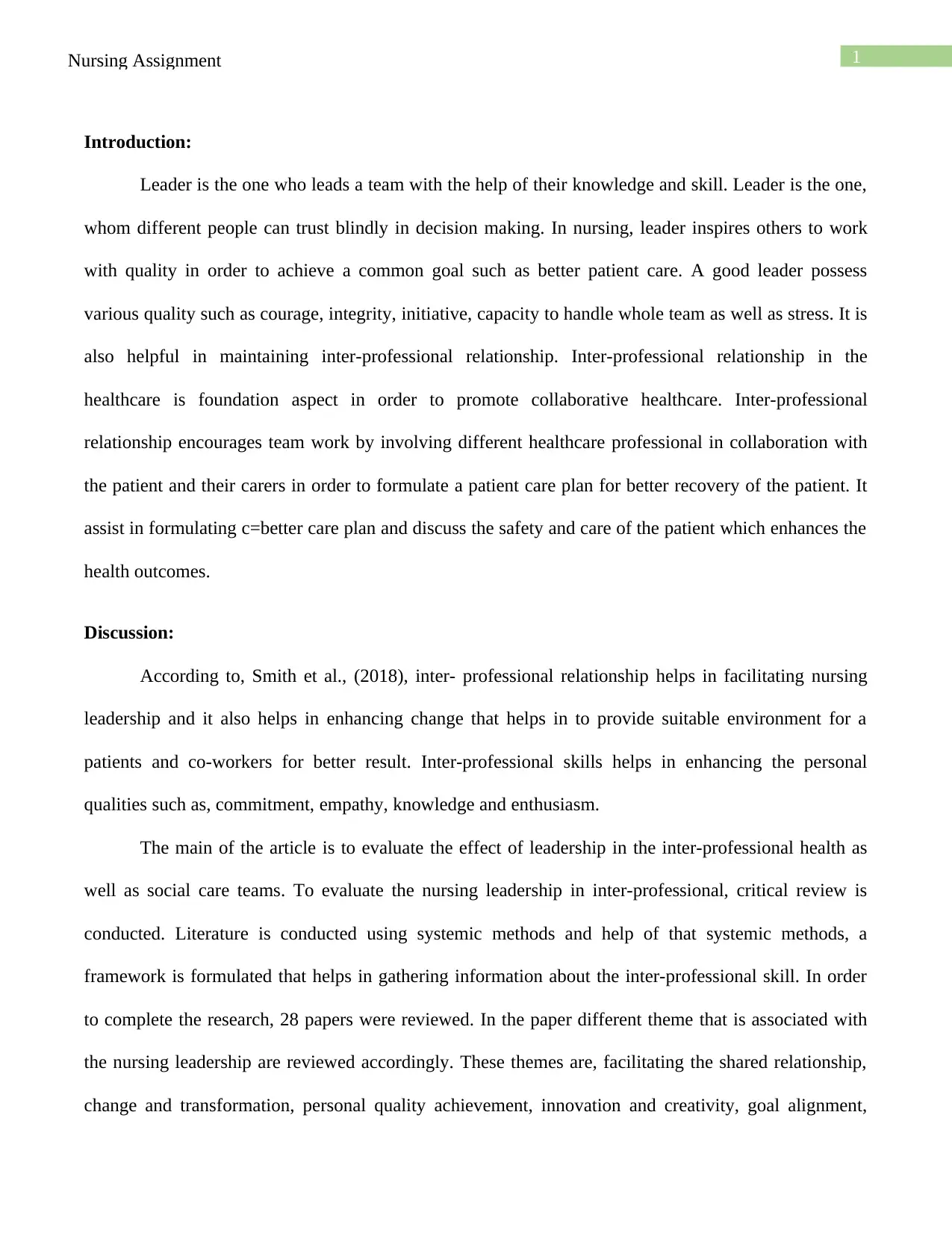
1Nursing Assignment
Introduction:
Leader is the one who leads a team with the help of their knowledge and skill. Leader is the one,
whom different people can trust blindly in decision making. In nursing, leader inspires others to work
with quality in order to achieve a common goal such as better patient care. A good leader possess
various quality such as courage, integrity, initiative, capacity to handle whole team as well as stress. It is
also helpful in maintaining inter-professional relationship. Inter-professional relationship in the
healthcare is foundation aspect in order to promote collaborative healthcare. Inter-professional
relationship encourages team work by involving different healthcare professional in collaboration with
the patient and their carers in order to formulate a patient care plan for better recovery of the patient. It
assist in formulating c=better care plan and discuss the safety and care of the patient which enhances the
health outcomes.
Discussion:
According to, Smith et al., (2018), inter- professional relationship helps in facilitating nursing
leadership and it also helps in enhancing change that helps in to provide suitable environment for a
patients and co-workers for better result. Inter-professional skills helps in enhancing the personal
qualities such as, commitment, empathy, knowledge and enthusiasm.
The main of the article is to evaluate the effect of leadership in the inter-professional health as
well as social care teams. To evaluate the nursing leadership in inter-professional, critical review is
conducted. Literature is conducted using systemic methods and help of that systemic methods, a
framework is formulated that helps in gathering information about the inter-professional skill. In order
to complete the research, 28 papers were reviewed. In the paper different theme that is associated with
the nursing leadership are reviewed accordingly. These themes are, facilitating the shared relationship,
change and transformation, personal quality achievement, innovation and creativity, goal alignment,
Introduction:
Leader is the one who leads a team with the help of their knowledge and skill. Leader is the one,
whom different people can trust blindly in decision making. In nursing, leader inspires others to work
with quality in order to achieve a common goal such as better patient care. A good leader possess
various quality such as courage, integrity, initiative, capacity to handle whole team as well as stress. It is
also helpful in maintaining inter-professional relationship. Inter-professional relationship in the
healthcare is foundation aspect in order to promote collaborative healthcare. Inter-professional
relationship encourages team work by involving different healthcare professional in collaboration with
the patient and their carers in order to formulate a patient care plan for better recovery of the patient. It
assist in formulating c=better care plan and discuss the safety and care of the patient which enhances the
health outcomes.
Discussion:
According to, Smith et al., (2018), inter- professional relationship helps in facilitating nursing
leadership and it also helps in enhancing change that helps in to provide suitable environment for a
patients and co-workers for better result. Inter-professional skills helps in enhancing the personal
qualities such as, commitment, empathy, knowledge and enthusiasm.
The main of the article is to evaluate the effect of leadership in the inter-professional health as
well as social care teams. To evaluate the nursing leadership in inter-professional, critical review is
conducted. Literature is conducted using systemic methods and help of that systemic methods, a
framework is formulated that helps in gathering information about the inter-professional skill. In order
to complete the research, 28 papers were reviewed. In the paper different theme that is associated with
the nursing leadership are reviewed accordingly. These themes are, facilitating the shared relationship,
change and transformation, personal quality achievement, innovation and creativity, goal alignment,
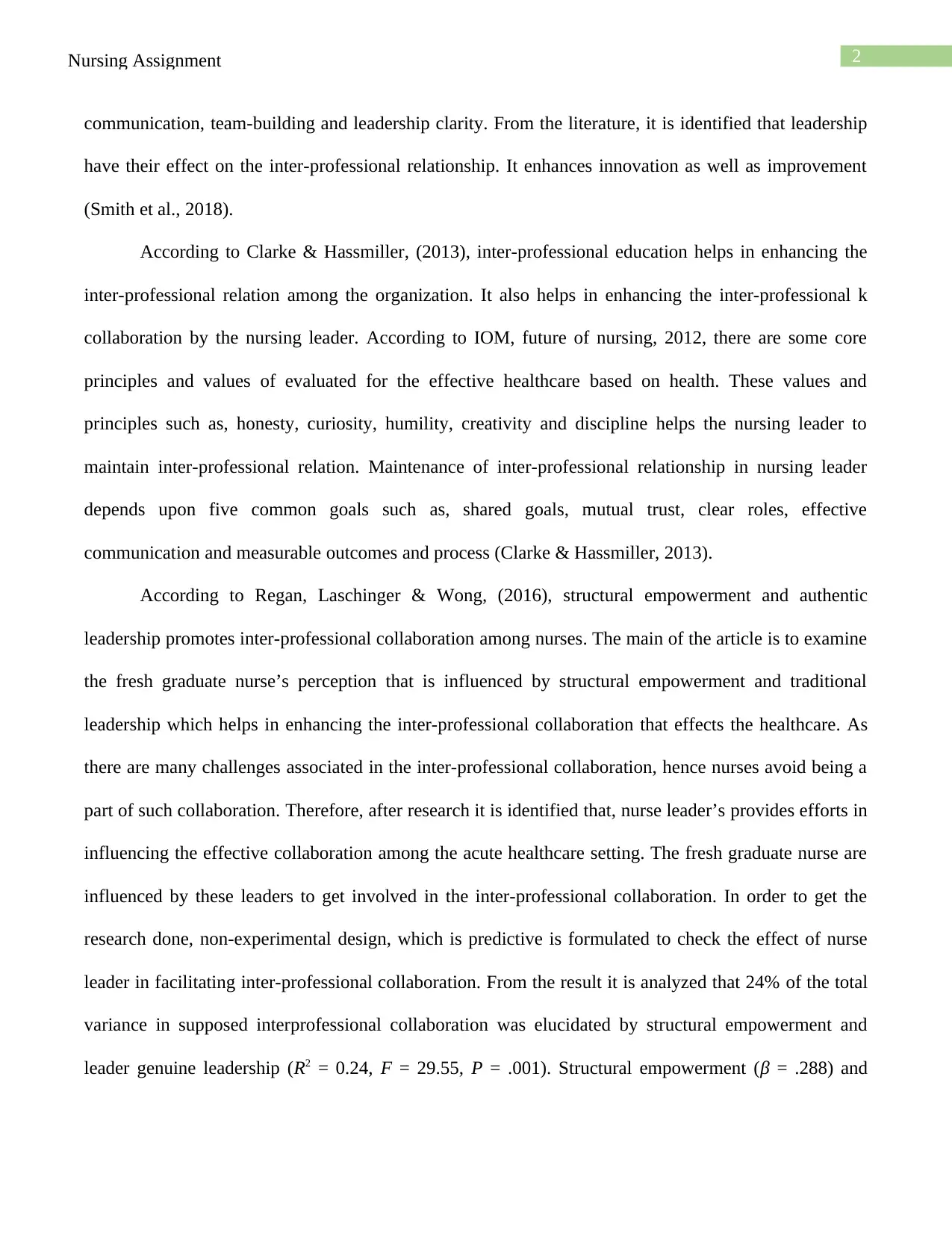
2Nursing Assignment
communication, team-building and leadership clarity. From the literature, it is identified that leadership
have their effect on the inter-professional relationship. It enhances innovation as well as improvement
(Smith et al., 2018).
According to Clarke & Hassmiller, (2013), inter-professional education helps in enhancing the
inter-professional relation among the organization. It also helps in enhancing the inter-professional k
collaboration by the nursing leader. According to IOM, future of nursing, 2012, there are some core
principles and values of evaluated for the effective healthcare based on health. These values and
principles such as, honesty, curiosity, humility, creativity and discipline helps the nursing leader to
maintain inter-professional relation. Maintenance of inter-professional relationship in nursing leader
depends upon five common goals such as, shared goals, mutual trust, clear roles, effective
communication and measurable outcomes and process (Clarke & Hassmiller, 2013).
According to Regan, Laschinger & Wong, (2016), structural empowerment and authentic
leadership promotes inter-professional collaboration among nurses. The main of the article is to examine
the fresh graduate nurse’s perception that is influenced by structural empowerment and traditional
leadership which helps in enhancing the inter-professional collaboration that effects the healthcare. As
there are many challenges associated in the inter-professional collaboration, hence nurses avoid being a
part of such collaboration. Therefore, after research it is identified that, nurse leader’s provides efforts in
influencing the effective collaboration among the acute healthcare setting. The fresh graduate nurse are
influenced by these leaders to get involved in the inter-professional collaboration. In order to get the
research done, non-experimental design, which is predictive is formulated to check the effect of nurse
leader in facilitating inter-professional collaboration. From the result it is analyzed that 24% of the total
variance in supposed interprofessional collaboration was elucidated by structural empowerment and
leader genuine leadership (R2 = 0.24, F = 29.55, P = .001). Structural empowerment (β = .288) and
communication, team-building and leadership clarity. From the literature, it is identified that leadership
have their effect on the inter-professional relationship. It enhances innovation as well as improvement
(Smith et al., 2018).
According to Clarke & Hassmiller, (2013), inter-professional education helps in enhancing the
inter-professional relation among the organization. It also helps in enhancing the inter-professional k
collaboration by the nursing leader. According to IOM, future of nursing, 2012, there are some core
principles and values of evaluated for the effective healthcare based on health. These values and
principles such as, honesty, curiosity, humility, creativity and discipline helps the nursing leader to
maintain inter-professional relation. Maintenance of inter-professional relationship in nursing leader
depends upon five common goals such as, shared goals, mutual trust, clear roles, effective
communication and measurable outcomes and process (Clarke & Hassmiller, 2013).
According to Regan, Laschinger & Wong, (2016), structural empowerment and authentic
leadership promotes inter-professional collaboration among nurses. The main of the article is to examine
the fresh graduate nurse’s perception that is influenced by structural empowerment and traditional
leadership which helps in enhancing the inter-professional collaboration that effects the healthcare. As
there are many challenges associated in the inter-professional collaboration, hence nurses avoid being a
part of such collaboration. Therefore, after research it is identified that, nurse leader’s provides efforts in
influencing the effective collaboration among the acute healthcare setting. The fresh graduate nurse are
influenced by these leaders to get involved in the inter-professional collaboration. In order to get the
research done, non-experimental design, which is predictive is formulated to check the effect of nurse
leader in facilitating inter-professional collaboration. From the result it is analyzed that 24% of the total
variance in supposed interprofessional collaboration was elucidated by structural empowerment and
leader genuine leadership (R2 = 0.24, F = 29.55, P = .001). Structural empowerment (β = .288) and
⊘ This is a preview!⊘
Do you want full access?
Subscribe today to unlock all pages.

Trusted by 1+ million students worldwide
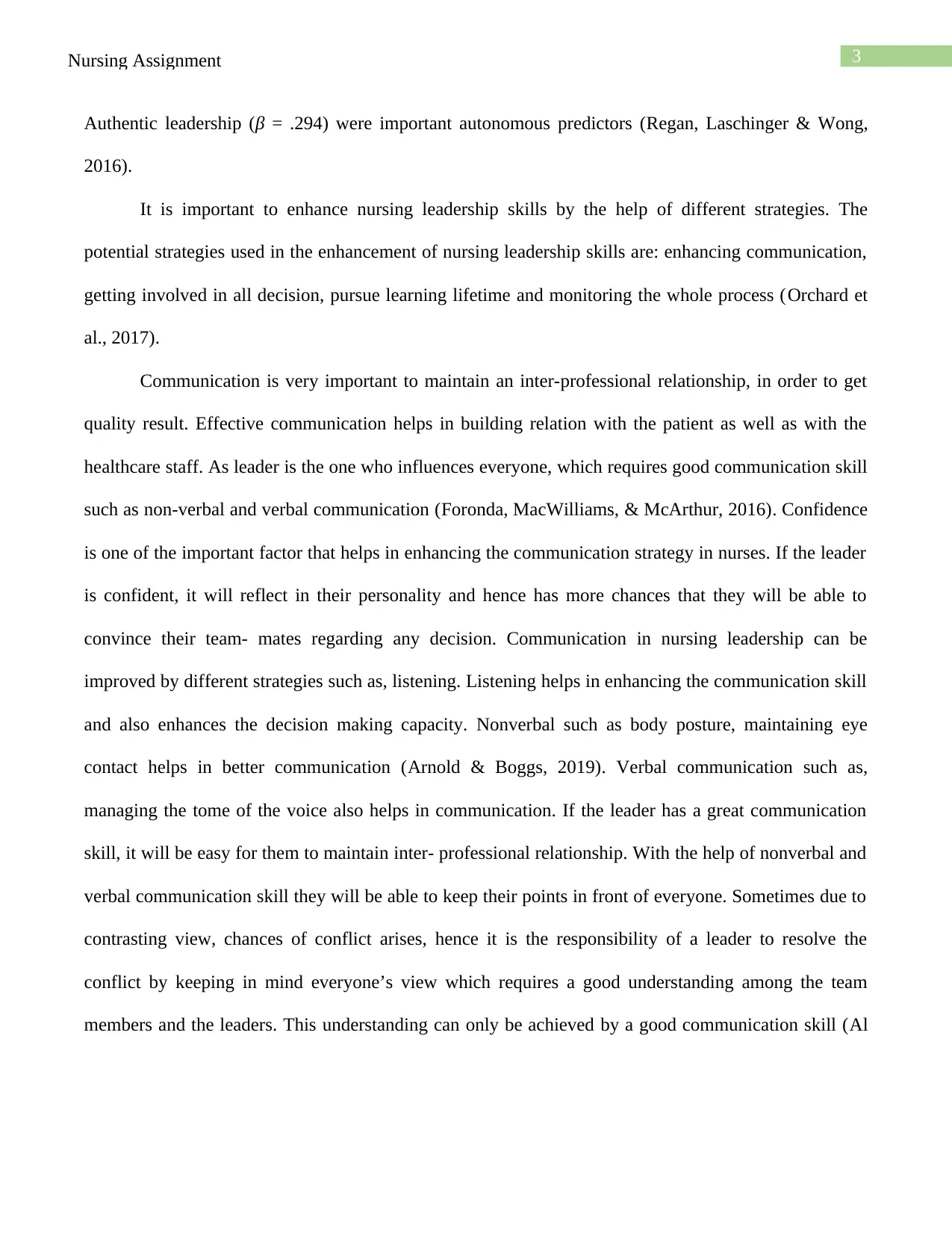
3Nursing Assignment
Authentic leadership (β = .294) were important autonomous predictors (Regan, Laschinger & Wong,
2016).
It is important to enhance nursing leadership skills by the help of different strategies. The
potential strategies used in the enhancement of nursing leadership skills are: enhancing communication,
getting involved in all decision, pursue learning lifetime and monitoring the whole process (Orchard et
al., 2017).
Communication is very important to maintain an inter-professional relationship, in order to get
quality result. Effective communication helps in building relation with the patient as well as with the
healthcare staff. As leader is the one who influences everyone, which requires good communication skill
such as non-verbal and verbal communication (Foronda, MacWilliams, & McArthur, 2016). Confidence
is one of the important factor that helps in enhancing the communication strategy in nurses. If the leader
is confident, it will reflect in their personality and hence has more chances that they will be able to
convince their team- mates regarding any decision. Communication in nursing leadership can be
improved by different strategies such as, listening. Listening helps in enhancing the communication skill
and also enhances the decision making capacity. Nonverbal such as body posture, maintaining eye
contact helps in better communication (Arnold & Boggs, 2019). Verbal communication such as,
managing the tome of the voice also helps in communication. If the leader has a great communication
skill, it will be easy for them to maintain inter- professional relationship. With the help of nonverbal and
verbal communication skill they will be able to keep their points in front of everyone. Sometimes due to
contrasting view, chances of conflict arises, hence it is the responsibility of a leader to resolve the
conflict by keeping in mind everyone’s view which requires a good understanding among the team
members and the leaders. This understanding can only be achieved by a good communication skill (Al
Authentic leadership (β = .294) were important autonomous predictors (Regan, Laschinger & Wong,
2016).
It is important to enhance nursing leadership skills by the help of different strategies. The
potential strategies used in the enhancement of nursing leadership skills are: enhancing communication,
getting involved in all decision, pursue learning lifetime and monitoring the whole process (Orchard et
al., 2017).
Communication is very important to maintain an inter-professional relationship, in order to get
quality result. Effective communication helps in building relation with the patient as well as with the
healthcare staff. As leader is the one who influences everyone, which requires good communication skill
such as non-verbal and verbal communication (Foronda, MacWilliams, & McArthur, 2016). Confidence
is one of the important factor that helps in enhancing the communication strategy in nurses. If the leader
is confident, it will reflect in their personality and hence has more chances that they will be able to
convince their team- mates regarding any decision. Communication in nursing leadership can be
improved by different strategies such as, listening. Listening helps in enhancing the communication skill
and also enhances the decision making capacity. Nonverbal such as body posture, maintaining eye
contact helps in better communication (Arnold & Boggs, 2019). Verbal communication such as,
managing the tome of the voice also helps in communication. If the leader has a great communication
skill, it will be easy for them to maintain inter- professional relationship. With the help of nonverbal and
verbal communication skill they will be able to keep their points in front of everyone. Sometimes due to
contrasting view, chances of conflict arises, hence it is the responsibility of a leader to resolve the
conflict by keeping in mind everyone’s view which requires a good understanding among the team
members and the leaders. This understanding can only be achieved by a good communication skill (Al
Paraphrase This Document
Need a fresh take? Get an instant paraphrase of this document with our AI Paraphraser
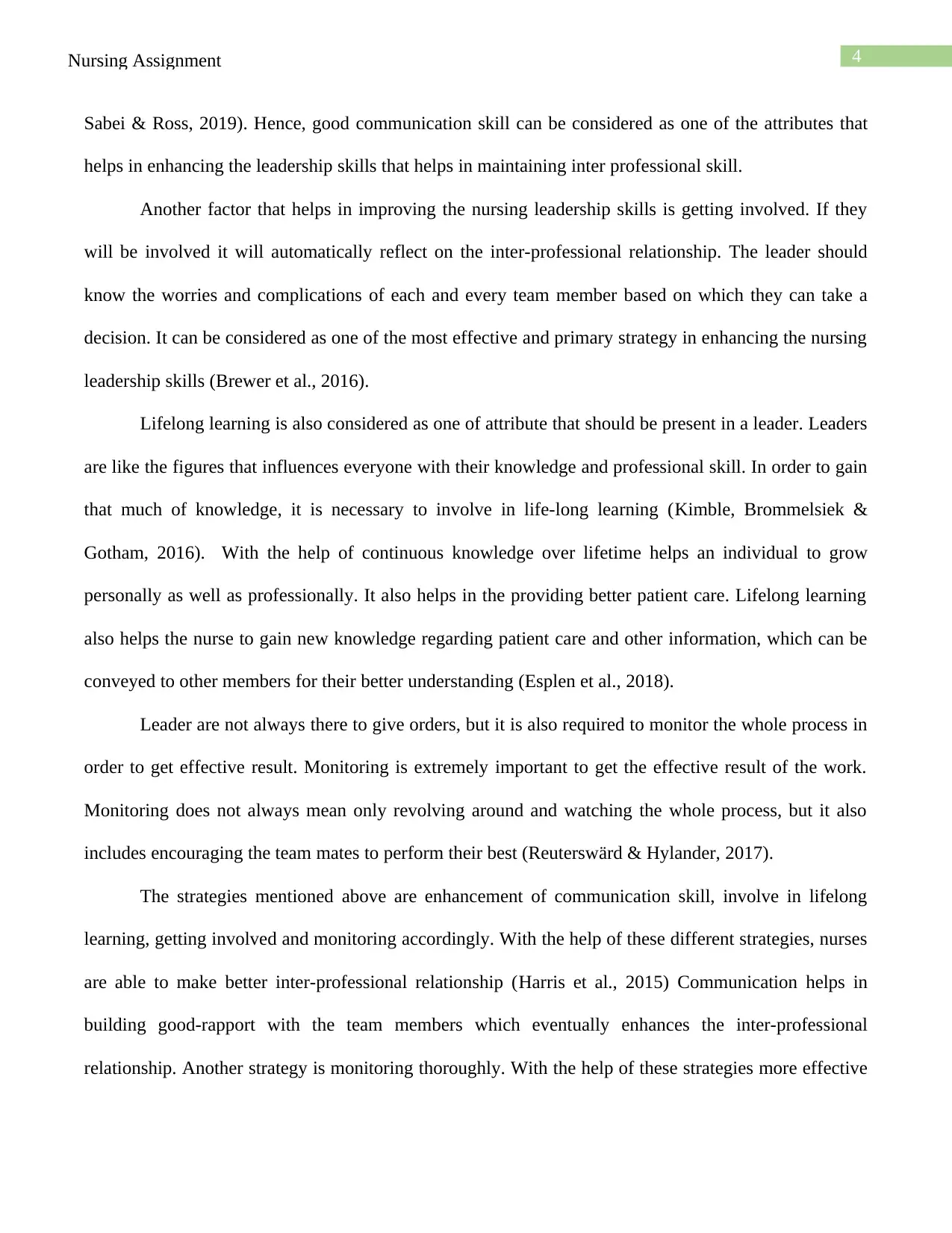
4Nursing Assignment
Sabei & Ross, 2019). Hence, good communication skill can be considered as one of the attributes that
helps in enhancing the leadership skills that helps in maintaining inter professional skill.
Another factor that helps in improving the nursing leadership skills is getting involved. If they
will be involved it will automatically reflect on the inter-professional relationship. The leader should
know the worries and complications of each and every team member based on which they can take a
decision. It can be considered as one of the most effective and primary strategy in enhancing the nursing
leadership skills (Brewer et al., 2016).
Lifelong learning is also considered as one of attribute that should be present in a leader. Leaders
are like the figures that influences everyone with their knowledge and professional skill. In order to gain
that much of knowledge, it is necessary to involve in life-long learning (Kimble, Brommelsiek &
Gotham, 2016). With the help of continuous knowledge over lifetime helps an individual to grow
personally as well as professionally. It also helps in the providing better patient care. Lifelong learning
also helps the nurse to gain new knowledge regarding patient care and other information, which can be
conveyed to other members for their better understanding (Esplen et al., 2018).
Leader are not always there to give orders, but it is also required to monitor the whole process in
order to get effective result. Monitoring is extremely important to get the effective result of the work.
Monitoring does not always mean only revolving around and watching the whole process, but it also
includes encouraging the team mates to perform their best (Reuterswärd & Hylander, 2017).
The strategies mentioned above are enhancement of communication skill, involve in lifelong
learning, getting involved and monitoring accordingly. With the help of these different strategies, nurses
are able to make better inter-professional relationship (Harris et al., 2015) Communication helps in
building good-rapport with the team members which eventually enhances the inter-professional
relationship. Another strategy is monitoring thoroughly. With the help of these strategies more effective
Sabei & Ross, 2019). Hence, good communication skill can be considered as one of the attributes that
helps in enhancing the leadership skills that helps in maintaining inter professional skill.
Another factor that helps in improving the nursing leadership skills is getting involved. If they
will be involved it will automatically reflect on the inter-professional relationship. The leader should
know the worries and complications of each and every team member based on which they can take a
decision. It can be considered as one of the most effective and primary strategy in enhancing the nursing
leadership skills (Brewer et al., 2016).
Lifelong learning is also considered as one of attribute that should be present in a leader. Leaders
are like the figures that influences everyone with their knowledge and professional skill. In order to gain
that much of knowledge, it is necessary to involve in life-long learning (Kimble, Brommelsiek &
Gotham, 2016). With the help of continuous knowledge over lifetime helps an individual to grow
personally as well as professionally. It also helps in the providing better patient care. Lifelong learning
also helps the nurse to gain new knowledge regarding patient care and other information, which can be
conveyed to other members for their better understanding (Esplen et al., 2018).
Leader are not always there to give orders, but it is also required to monitor the whole process in
order to get effective result. Monitoring is extremely important to get the effective result of the work.
Monitoring does not always mean only revolving around and watching the whole process, but it also
includes encouraging the team mates to perform their best (Reuterswärd & Hylander, 2017).
The strategies mentioned above are enhancement of communication skill, involve in lifelong
learning, getting involved and monitoring accordingly. With the help of these different strategies, nurses
are able to make better inter-professional relationship (Harris et al., 2015) Communication helps in
building good-rapport with the team members which eventually enhances the inter-professional
relationship. Another strategy is monitoring thoroughly. With the help of these strategies more effective
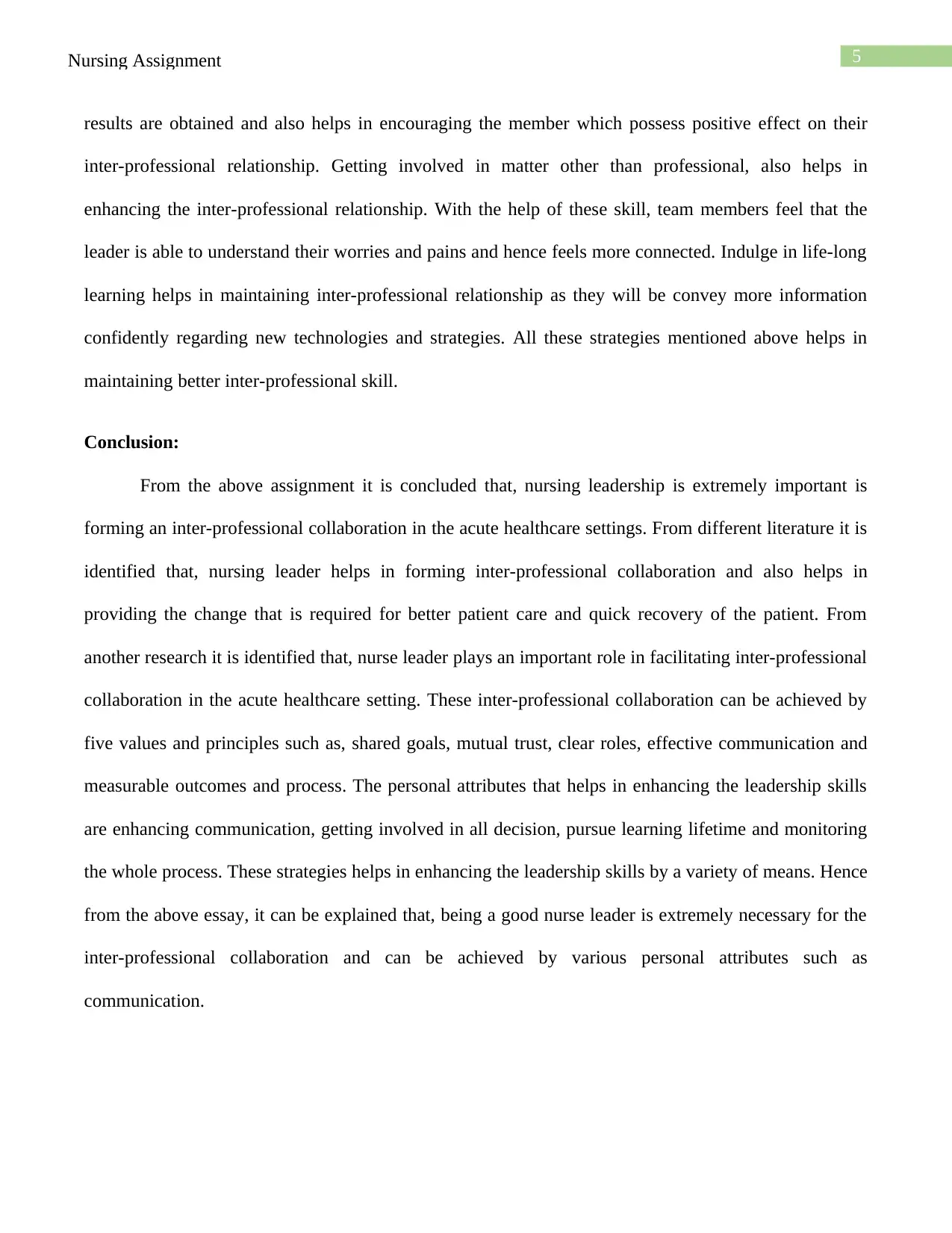
5Nursing Assignment
results are obtained and also helps in encouraging the member which possess positive effect on their
inter-professional relationship. Getting involved in matter other than professional, also helps in
enhancing the inter-professional relationship. With the help of these skill, team members feel that the
leader is able to understand their worries and pains and hence feels more connected. Indulge in life-long
learning helps in maintaining inter-professional relationship as they will be convey more information
confidently regarding new technologies and strategies. All these strategies mentioned above helps in
maintaining better inter-professional skill.
Conclusion:
From the above assignment it is concluded that, nursing leadership is extremely important is
forming an inter-professional collaboration in the acute healthcare settings. From different literature it is
identified that, nursing leader helps in forming inter-professional collaboration and also helps in
providing the change that is required for better patient care and quick recovery of the patient. From
another research it is identified that, nurse leader plays an important role in facilitating inter-professional
collaboration in the acute healthcare setting. These inter-professional collaboration can be achieved by
five values and principles such as, shared goals, mutual trust, clear roles, effective communication and
measurable outcomes and process. The personal attributes that helps in enhancing the leadership skills
are enhancing communication, getting involved in all decision, pursue learning lifetime and monitoring
the whole process. These strategies helps in enhancing the leadership skills by a variety of means. Hence
from the above essay, it can be explained that, being a good nurse leader is extremely necessary for the
inter-professional collaboration and can be achieved by various personal attributes such as
communication.
results are obtained and also helps in encouraging the member which possess positive effect on their
inter-professional relationship. Getting involved in matter other than professional, also helps in
enhancing the inter-professional relationship. With the help of these skill, team members feel that the
leader is able to understand their worries and pains and hence feels more connected. Indulge in life-long
learning helps in maintaining inter-professional relationship as they will be convey more information
confidently regarding new technologies and strategies. All these strategies mentioned above helps in
maintaining better inter-professional skill.
Conclusion:
From the above assignment it is concluded that, nursing leadership is extremely important is
forming an inter-professional collaboration in the acute healthcare settings. From different literature it is
identified that, nursing leader helps in forming inter-professional collaboration and also helps in
providing the change that is required for better patient care and quick recovery of the patient. From
another research it is identified that, nurse leader plays an important role in facilitating inter-professional
collaboration in the acute healthcare setting. These inter-professional collaboration can be achieved by
five values and principles such as, shared goals, mutual trust, clear roles, effective communication and
measurable outcomes and process. The personal attributes that helps in enhancing the leadership skills
are enhancing communication, getting involved in all decision, pursue learning lifetime and monitoring
the whole process. These strategies helps in enhancing the leadership skills by a variety of means. Hence
from the above essay, it can be explained that, being a good nurse leader is extremely necessary for the
inter-professional collaboration and can be achieved by various personal attributes such as
communication.
⊘ This is a preview!⊘
Do you want full access?
Subscribe today to unlock all pages.

Trusted by 1+ million students worldwide
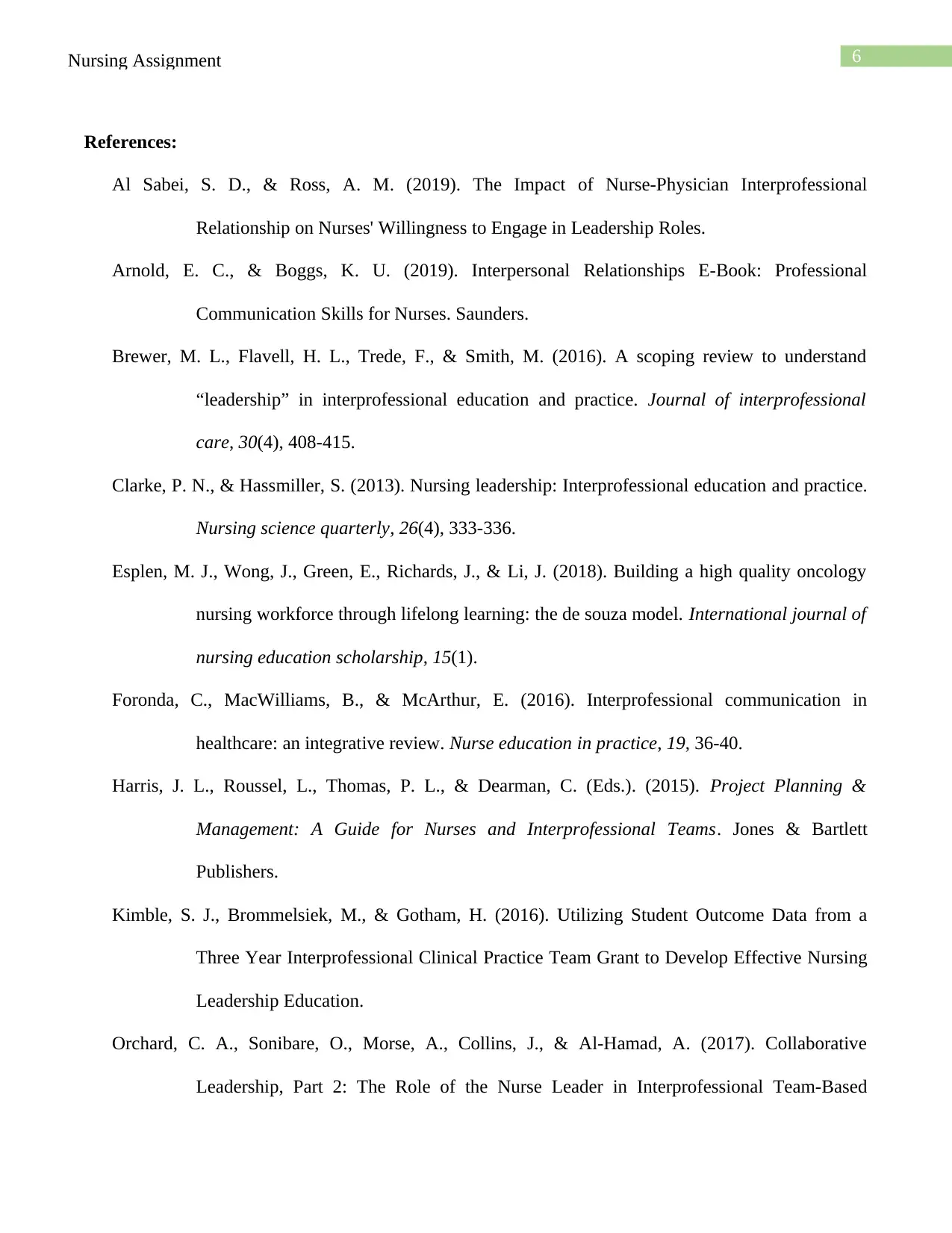
6Nursing Assignment
References:
Al Sabei, S. D., & Ross, A. M. (2019). The Impact of Nurse-Physician Interprofessional
Relationship on Nurses' Willingness to Engage in Leadership Roles.
Arnold, E. C., & Boggs, K. U. (2019). Interpersonal Relationships E-Book: Professional
Communication Skills for Nurses. Saunders.
Brewer, M. L., Flavell, H. L., Trede, F., & Smith, M. (2016). A scoping review to understand
“leadership” in interprofessional education and practice. Journal of interprofessional
care, 30(4), 408-415.
Clarke, P. N., & Hassmiller, S. (2013). Nursing leadership: Interprofessional education and practice.
Nursing science quarterly, 26(4), 333-336.
Esplen, M. J., Wong, J., Green, E., Richards, J., & Li, J. (2018). Building a high quality oncology
nursing workforce through lifelong learning: the de souza model. International journal of
nursing education scholarship, 15(1).
Foronda, C., MacWilliams, B., & McArthur, E. (2016). Interprofessional communication in
healthcare: an integrative review. Nurse education in practice, 19, 36-40.
Harris, J. L., Roussel, L., Thomas, P. L., & Dearman, C. (Eds.). (2015). Project Planning &
Management: A Guide for Nurses and Interprofessional Teams. Jones & Bartlett
Publishers.
Kimble, S. J., Brommelsiek, M., & Gotham, H. (2016). Utilizing Student Outcome Data from a
Three Year Interprofessional Clinical Practice Team Grant to Develop Effective Nursing
Leadership Education.
Orchard, C. A., Sonibare, O., Morse, A., Collins, J., & Al-Hamad, A. (2017). Collaborative
Leadership, Part 2: The Role of the Nurse Leader in Interprofessional Team-Based
References:
Al Sabei, S. D., & Ross, A. M. (2019). The Impact of Nurse-Physician Interprofessional
Relationship on Nurses' Willingness to Engage in Leadership Roles.
Arnold, E. C., & Boggs, K. U. (2019). Interpersonal Relationships E-Book: Professional
Communication Skills for Nurses. Saunders.
Brewer, M. L., Flavell, H. L., Trede, F., & Smith, M. (2016). A scoping review to understand
“leadership” in interprofessional education and practice. Journal of interprofessional
care, 30(4), 408-415.
Clarke, P. N., & Hassmiller, S. (2013). Nursing leadership: Interprofessional education and practice.
Nursing science quarterly, 26(4), 333-336.
Esplen, M. J., Wong, J., Green, E., Richards, J., & Li, J. (2018). Building a high quality oncology
nursing workforce through lifelong learning: the de souza model. International journal of
nursing education scholarship, 15(1).
Foronda, C., MacWilliams, B., & McArthur, E. (2016). Interprofessional communication in
healthcare: an integrative review. Nurse education in practice, 19, 36-40.
Harris, J. L., Roussel, L., Thomas, P. L., & Dearman, C. (Eds.). (2015). Project Planning &
Management: A Guide for Nurses and Interprofessional Teams. Jones & Bartlett
Publishers.
Kimble, S. J., Brommelsiek, M., & Gotham, H. (2016). Utilizing Student Outcome Data from a
Three Year Interprofessional Clinical Practice Team Grant to Develop Effective Nursing
Leadership Education.
Orchard, C. A., Sonibare, O., Morse, A., Collins, J., & Al-Hamad, A. (2017). Collaborative
Leadership, Part 2: The Role of the Nurse Leader in Interprofessional Team-Based
Paraphrase This Document
Need a fresh take? Get an instant paraphrase of this document with our AI Paraphraser
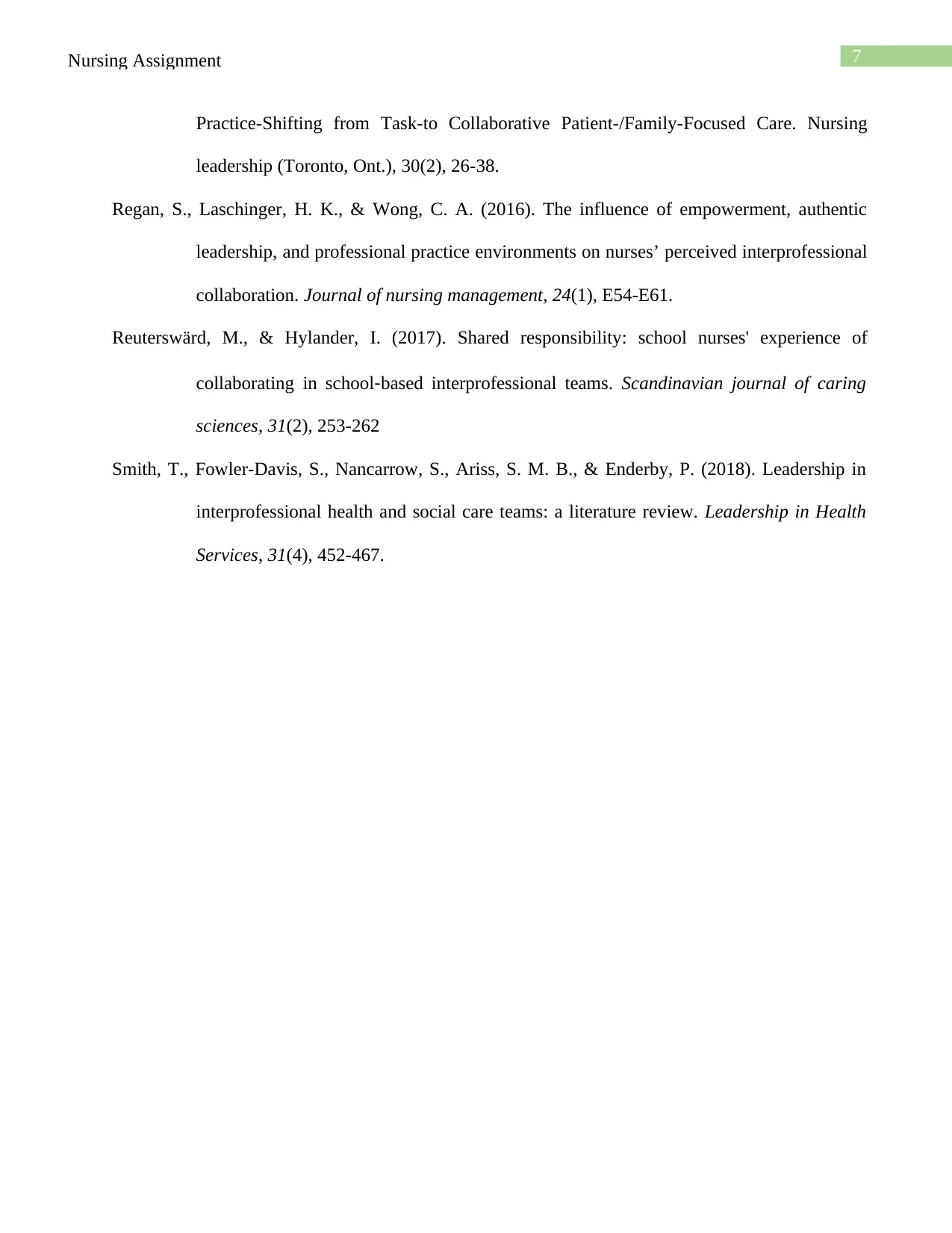
7Nursing Assignment
Practice-Shifting from Task-to Collaborative Patient-/Family-Focused Care. Nursing
leadership (Toronto, Ont.), 30(2), 26-38.
Regan, S., Laschinger, H. K., & Wong, C. A. (2016). The influence of empowerment, authentic
leadership, and professional practice environments on nurses’ perceived interprofessional
collaboration. Journal of nursing management, 24(1), E54-E61.
Reuterswärd, M., & Hylander, I. (2017). Shared responsibility: school nurses' experience of
collaborating in school‐based interprofessional teams. Scandinavian journal of caring
sciences, 31(2), 253-262
Smith, T., Fowler-Davis, S., Nancarrow, S., Ariss, S. M. B., & Enderby, P. (2018). Leadership in
interprofessional health and social care teams: a literature review. Leadership in Health
Services, 31(4), 452-467.
Practice-Shifting from Task-to Collaborative Patient-/Family-Focused Care. Nursing
leadership (Toronto, Ont.), 30(2), 26-38.
Regan, S., Laschinger, H. K., & Wong, C. A. (2016). The influence of empowerment, authentic
leadership, and professional practice environments on nurses’ perceived interprofessional
collaboration. Journal of nursing management, 24(1), E54-E61.
Reuterswärd, M., & Hylander, I. (2017). Shared responsibility: school nurses' experience of
collaborating in school‐based interprofessional teams. Scandinavian journal of caring
sciences, 31(2), 253-262
Smith, T., Fowler-Davis, S., Nancarrow, S., Ariss, S. M. B., & Enderby, P. (2018). Leadership in
interprofessional health and social care teams: a literature review. Leadership in Health
Services, 31(4), 452-467.
1 out of 8
Related Documents
Your All-in-One AI-Powered Toolkit for Academic Success.
+13062052269
info@desklib.com
Available 24*7 on WhatsApp / Email
![[object Object]](/_next/static/media/star-bottom.7253800d.svg)
Unlock your academic potential
Copyright © 2020–2026 A2Z Services. All Rights Reserved. Developed and managed by ZUCOL.





